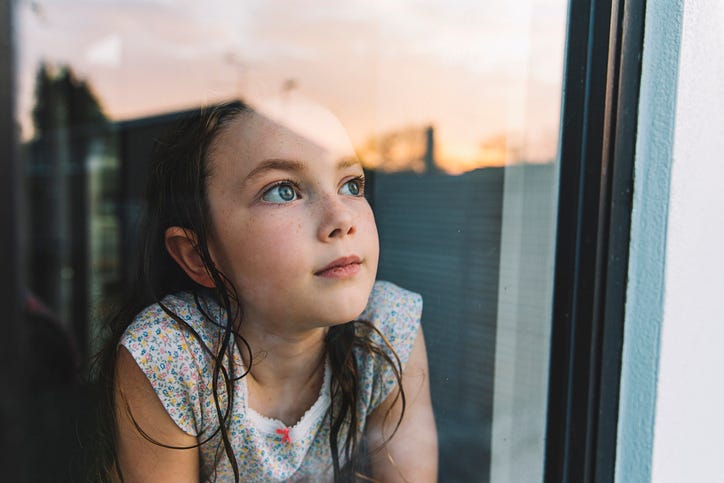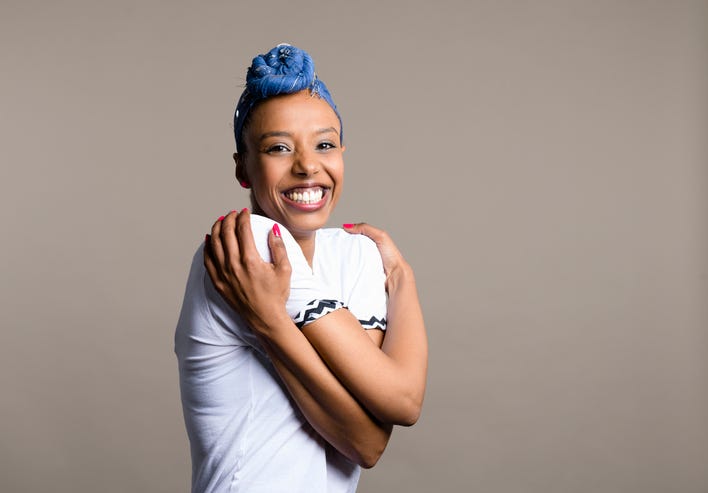Hey, friends.
Some of you know this about me, and some of you don’t.
I’ve embodied many experiences and beliefs in my 33 years of life.
I’ve been cautious of vaccines and in favor of them.
I’ve been a registered Republican (for no good reason but upbringing) and a registered Democrat (while wanting nothing to do with either of them).
I’ve been pro-healthy-sex and part of the purity movement.
I’ve been ignorant and I’ve learned to be better.
I’ve messed up and I’ve tried again.
I’ve been a people-pleaser and a boundary-enforcer.
I’ve been actively assimilating and worked toward decolonization.
I’ve hurt people and I’ve been hurt by people.
Do you see where I’m going with this? We are, of course, more than the seemingly opposing positions we’ve taken over the years. We are complex and nuanced, too.
The title of today’s piece is Having Grace for the Person You Have Been and this is a tough one. I even write about this at the end of my book, Native:
One of the most anxiety-ridden realities of writing a book is that these words are trapped in time. As I write, you are getting the Kaitlin of her thirtieth year of life, the one who has only learned as much as she can by this point. By this time next year, she will know new things, and those things will shape her. She will have found better ways to express love, better language to fight hate, and will have learned more from the books that have yet to be written by others in the world doing extraordinary work.
What you get right now is me, and I pray that as I grow, you hold that space with me, and that as you grow, I hold that space with you. May we look back on our long-ago selves with kind- ness and know that there were always things we should have done better.
I can’t wait to see where this journey takes us—together.
I wrote this as the afterword of the book because I’ve seen this time after time—authors get berated for what they wrote when they should have known better. But the problem is, we didn’t know better yet. We were still learning. We were still ignorant of something.
I am someone who is constantly learning. Like a little kid, I light up when I make a new connection. It excites me to no end to find new ways of being human that are equitable and courageous. I need that in my life— it doesn’t mean I won’t make mistakes.
But it does mean I am committed to learning a better way, and I believe you are, too, and that’s why you’re here.
I wrote this blog post while I was working on Native, as I was processing all of this.
So, I hope these words speak to you, and remind you to have some grace for who you’ve been, who you are now, and who you’ll be in an hour, tomorrow, next year.
Having Grace for the Person You have been:
I am in the middle of writing my second book. Anyone who has written a book, or even an article that is published, knows the embarrassment that comes with looking back on something you’ve written and wondering, How on earth did I think that? Really. I think this all the time about previous stuff I wrote, which is why I started this series!
Our cheeks flush red and we hope that our current Twitter followers don’t judge us by our ignorance. We hope that they will understand how much we’ve grown, how much work we’re doing to be better than we once were while also helping hold us accountable to who we should be.
I wrote a piece a few months ago on the death of John Allen Chau, missionary to the Sentinelese Islands who endangered an Indigenous people, and they acted to protect themselves. As I read the story, I thought back to the young woman I once was, the young woman in the baptist church who was so sure that she would save the world and bring the people around her to Jesus. Love was mixed with colonization, and I had no idea that I was playing a part in one of the greatest tragedies to happen upon mankind: destroying one another in the name of Jesus. This is a tension that I know a lot of us face who grew up in evangelical Christian spaces. We are still complicit, even as we work to decolonize.
And so, as I write my second book, I fear for the woman I will become and the one I am now. I feel like I’m learning a thousand lessons a day from Twitter and parenting alone, so what if I read my own words two years from now and I’m disgusted with what I see? This space has been evolving for me— I have gained better boundaries with social media over the last two years. It is a space to work, to write, but not a space where strangers or trolls get to define my identity.
There, it seems, I must find grace for who I once was. I must find grace for the woman I have been.
It took some time for me, in therapy over the last year, to learn that I need to look back with a constant love note to the girl I was, the girl who didn’t understand fully the systems that shaped her. She was full of love, but sometimes had trouble finding the right outlet for it. She was fueled by community and connection, yet she didn’t have words for it.
I know now.
And yet, I don’t know much.
And when I’m older, I will say the same things.
I meet people all the time who, when I tell them something about the struggle of being Indigenous or a part of our history that is often covered up, they say, “I just didn’t know, I’m so sorry.” In that moment, I’m not looking for an apology; I’m pointing to our education and church systems that have so badly prepared us for conversations like this, systems that erase the stories of Indigenous peoples and people of color.
I’m looking to say, “You didn’t know, but now you do. What happens next? What you will do for the next generation?” This is still something really important that I hold to when I travel and speak, when I share stories, when I write books. I don’t think people change when they are shamed into it. I think we change when we realize it brings us all closer to one another, to Divine Love. I really do believe we can tell the truth in fiercely gentle ways, naming the wrong while extending an invitation to what can be better.
Does that mean I allow people to walk all over me as I try to explain colonization to them? Of course not. I am often distrustful of people, and have stopped expecting the best from everyone. Some people are not ready to begin truth-telling as the path to healing, and I know that. But I will hold space and hope for the ones that are ready, and we will do it together.
Our dearest Mary Oliver said,
“Tell me, what is it you plan to do with your one wild and precious life?”
Well, perhaps one thing we should plan to do is know RIGHT NOW that we will be disappointed in a few things about who we are.
Perhaps if we know RIGHT NOW that we will be ever growing, ever changing, ever evolving, we will have more grace even for future us.
I live in a spotlight on social media, as do many. Educators, activists, commentary writers, journalists, religious leaders, politicians– we are put under a scrutiny that is well-deserved, because we are speaking on behalf of not only ourselves but those we wish so much to better care for.
I speak on behalf of my own story as a mixed woman who is Indigenous and white, and yet, when others see me, I represent so much of the Indigenous story. It’s not right, of course; we are not a monolith, and we have individual experiences, layered with privilege or lack of it. We’ve got to be honest about that, too.
There will be plenty of unrelenting criticism.
There will be plenty of rage over things we’ve said and done, over things we’ve left unsaid and undone.
And there should be, because we are looking in a mirror. We are asking to see who we really are as America, and we are asking for our systems of oppression to be taken down. That should happen, and the way of grace says that it should happen with holy fire.
As Rumi writes, “Stay in the spiritual fire. Let it cook you.”
Perhaps, in this space, if we begin with grace for ourselves, we will learn to follow with grace for one another.
We live in an era in which people like to out-woke one another, all in vain. But I wouldn’t dare call myself woke when there’s still so much waking to do.
This statement allows me to recognize that I haven’t arrived, and if I haven’t arrived, neither did the nine year old me whose father had just left, and neither will the 80 year old me who is struggling with what it means to age with kindness and sometimes feel alone.
This statement allows me to apologize when I get it wrong and work to make it right, like I’ve seen others do.
What if we chose the way of grace?
What if, when we know our own faults, we also know our own strengths?
And if we know our own faults and our own strengths, can we call those out of each other when the time is right?
Our systems of oppression must be toppled. That will never change.
The question is, what kind of people will we be in the midst of it?
We can be people full of grace and full of anger, make no mistake about that. Our anger leads us to ask questions, and grace is the partner that holds our hand along the way.
Can you feel that?
Can you believe that?
Perhaps the child that still sits in a chair in the corner of your soul is asking you to tell them something. Sometimes we need to go back and read our own words to ourselves. These words made me cry. I need to practice loving my child self more—how about you??
Perhaps the young adult that still rests at the pit of your stomach wants you to say, “It’s okay. I get it,” and mean it.
Perhaps the person that you’ve sought to understand but can’t needs you to step into the fray and speak, “I want to know your story and understand.”
With grace.
With grace.
With grace.
With fierce love that invites us into a better way, too.








This has brought tears! I’m 67 and I look back to who I’ve been and have not given myself grace. Thank you for this reminder. I’m not sure if I’m a member and could you tell me where to find the casual blessings. I’ve been a little out of the loop for a while.
This post touched me very deeply. I'm grateful my 8-year-old self wrote my present self a letter that I will keep cherished and unopened until my 80th birthday. On that day I will also read the letter my 80-year-old self wrote to my 8-year-old self. What a beautiful day that will be.